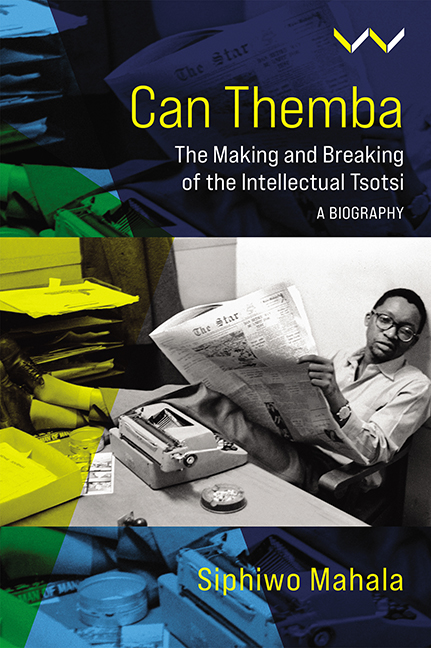Book contents
- Frontmatter
- Dedication
- Epigraph
- Contents
- List of Illustrations
- Acknowledgements
- Introduction
- PART I Death and Birth of a Scribe
- PART II ‘Live Fast and Die Young’
- PART III The ‘Intellectual Tsotsi’
- PART IV Dances with Texts: Writing and Storytelling
- PART V A Writer’s Immortality
- Postscript: The Three Burials of Can Themba
- Notes
- Bibliography
- Index
13 - No Ordinary Storyteller
Published online by Cambridge University Press: 26 May 2022
- Frontmatter
- Dedication
- Epigraph
- Contents
- List of Illustrations
- Acknowledgements
- Introduction
- PART I Death and Birth of a Scribe
- PART II ‘Live Fast and Die Young’
- PART III The ‘Intellectual Tsotsi’
- PART IV Dances with Texts: Writing and Storytelling
- PART V A Writer’s Immortality
- Postscript: The Three Burials of Can Themba
- Notes
- Bibliography
- Index
Summary
There's a theory that was associated with T. S. Eliot,where he says the mind that creates is different from the man who suffers. So T. S. Eliot made a distinction between the experience of a writer and what he writes about. Can Themba collapsed that distinction. The man who suffers and the mind that creates is one and the same thing.
Muxe Nkondo — Interview (2015)The life history of Can Themba is as amorphous as much of his writing, a great deal of which is hard to define in terms of conventional literary genres. Both in his writing and in his lived experience, Themba challenged established conventions and orthodoxies regarding intellectual behaviour, ideologies, reading, writing, life and living.
He was, as Es’kia Mphahlele puts it, ‘a rebel par excellence’. In his tribute to his mentor and icon, Harry Mashabela concurs with Mphahlele: ‘Can was over-complex. A rebel. A man of the people. A kind of genius. A rascal. Sensible. Nonsensical. All crammed up in one man. And yet he remained something of a legend. As a rebel, he scorned convention, tradition, custom and loathed authority. But as a man of the people, he lived at the very bottom of life, mixing with the lowly and doing precisely what he himself felt was the right thing to do.’
The elements mentioned by Mashabela and Mphahlele are repeated by several people who interacted with Themba. These elements are also palpable in his writing, which is characterised by abundant wit and irony, with a magnetic turn of phrase that captivates the reader.
A close reading of Themba's works reveals that from inside the House of Truth, he wrote his own life history. However, few of his stories fit conventional literary genres, and the volatility of his writing earned Themba both critical praise and rebuke in equal measure.
One eminent scholar who was critical of his works is Muxe Nkondo, who, as a student, encountered Themba during a guestteaching visit to Orlando High School in Soweto in the late 1950s. While Nkondo was impressed with Themba's lesson, which seems to have stayed with him in perpetuity (as described in Chapter 3), this did not cloud his judgement of The Will to Die, about which he wrote a very unflattering review.
- Type
- Chapter
- Information
- Can ThembaThe Making and Breaking of the Intellectual Tsotsi, a Biography, pp. 159 - 170Publisher: Wits University PressPrint publication year: 2022



